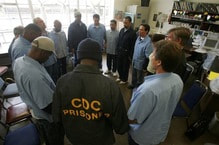|
Greater Good: The Science of a Meaningful Life
By Jill Suttie | June 9, 2015 The Insight Prison Project helps incarcerated men learn new emotional skills in order to succeed in and out of prison. But it can also help crime survivors. A dozen men sit in a circle. Some are old and some are young. A facilitator asks each one to check in with the group about how they are feeling emotionally, physically, or spiritually. Sometimes a man tears up with emotion as he talks. The others listen, offering nods of support or asking clarifying questions. It sounds like a typical men’s support group—until you know these men are all prisoners incarcerated at San Quentin Prison. This is a Victim Offender Education Group (or VOEG), an outgrowth of a movement that aims to help people who’ve committed crimes take responsibility for the harm they’ve caused others and to make amends to the victims of crime and their community. Operating within the criminal justice system as an alternative to punishment alone, these “restorative justice” programs help prove that personal transformation is possible, even for people who’ve committed the most serious crimes. To read the complete article 'Can Restorative Justice Help Prisoners to Heal?' on the Great Good website, please click here.
3 Comments
Sharon Martinas
6/12/2019 01:51:59 pm
I wish the restorative justice process could replace the parole
Reply
The process doesn’t just help the inmates to grow. It can also help the survivors. When you’re sitting across from a person who has pulled the trigger and ended another person’s life, and you are telling them about your child attending their father’s funeral, you see the impact on that man.
Reply
Leave a Reply. |
Archives
March 2019
Categories |


 RSS Feed
RSS Feed
